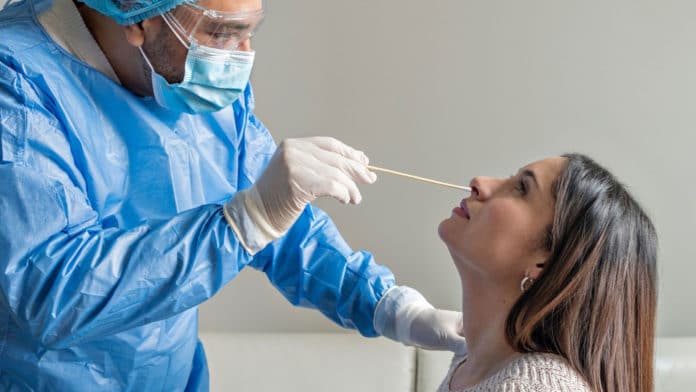According to an initial evaluation of the Spanish COGESTCOV-19 project, babies born to mothers who suffered COVID-19 disease during pregnancy seem to exhibit differences in neurodevelopmental outcomes at six weeks.
The project followed the course of pregnancy and baby development in mothers infected with COVID-19. Scientists presented the data on pregnancy and post-natal assessment six weeks after birth.
Scientists found that babies born to women with COVID-19 disease during pregnancy appear to differ in neurodevelopmental outcomes at six weeks. Such babies show difficulties in relaxing and adapting their bodies when they are being held compared to infants from non-infected mothers, mainly when the infection occurs in late pregnancy. Plus, they tend to show greater difficulty controlling head and shoulder movement. These alterations suggest a possible COVID-19 effect on motor function (movement control).
Project Leader Dr. Rosa Ayesa Arriola said: “Not all babies born to mothers infected with COVID show neurodevelopmental differences, but our data shows that their risk is increased compared to those not exposed to COVID in the womb. We need a bigger study to confirm the exact extent of the difference.”
The initial evaluation compared babies born to 21 COVID positive pregnant women and their babies, with 21 healthy controls attending the Marqués de Valdecilla University Hospital in Santander, Spain. The mothers underwent a series of tests during and after pregnancy. These included hormonal and other biochemical tests (such as cortisol levels, immunological response, etc.), salivary tests, movement responses, and psychological questionnaires. All analyses were adjusted for infant age, sex, and other factors.
The post-natal tests included the Neonatal Behavioral Assessment Scale (NBAS), which measures the baby’s movement and behavior.
Ms. Águeda Castro Quintas (the University of Barcelona, Network Centre for Biomedical Research in Mental Health) said: “We found that certain elements of the NBAS measurement were changed in 6-week-old infants who had been exposed to the SARS-COV-2 virus. Effectively they react slightly differently to being held or cuddled.”
We have been especially sensitive in how we have conducted these tests. Clinicians closely examined each mother and baby with expert training in the field and the tests.
We need to note that these are preliminary results, but this is part of a project following a larger sample of 100 mothers and their babies. They have also been monitored during pregnancy and after birth. We also plan to compare these mothers and babies with data from another similar project (the epi-project) that looks at stress and genetics’ effect on a child’s neurodevelopment.”
Águeda Castro Quintas continued: “This is an ongoing project, and we are at an early stage. We found that babies whose mothers had been exposed to COVID did show neurological effects at six weeks, but we don’t know if these effects will result in any longer-term issues, longer-term observation may help us understand this.”
Co-researcher Nerea San Martín González, added: “Of course, in babies who are so young, there are several things we can’t measure, such as language skills or cognition. We also need to be aware that this is a comparatively small sample, so we are repeating the work, and we will follow this up over a longer period.”
“We need a bigger sample to determine the role of infection on offspring’s neurodevelopmental alterations and the contribution of other environmental factors. In the meantime, we need to stress the importance of medical monitoring to facilitate a healthy pregnancy, discussing any concerns with your doctor.”
Commenting, Project Leader Dr. Rosa Ayesa Arriola said: “This is the right moment to establish international collaborations that would permit us to assess long-term neurodevelopment in children born during the COVID-19 pandemic. Research in this field is vital in understanding and preventing possible neurological problems and mental health vulnerabilities in those children in the coming years.”
In an independent comment, Dr. Livio Provenzi (University of Pavia, Italy) said: “There is a great need to study both direct and indirect effects of the COVID-19 pandemic on the health and well-being of parents and infants. Pregnancy is a period of life which shapes much of our subsequent development, and exposure to adversity in pregnancy can leave long-lasting biological footprints.”
“These findings from Dr. Rosa Ayesa Arriola’s group reinforce evidence of epigenetic alterations in infants born from mothers exposed to pandemic-related stress during pregnancy. It shows we need more large scale, international research to allow us to understand the developmental effects of this health emergency and to deliver better quality of care to parents and infants.”
The preliminary analysis presented in the 30th European Congress of Psychiatry.
